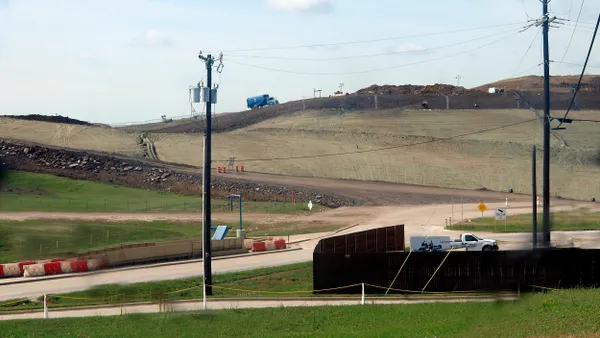Dive Brief:
- Dothan, Alabama, received permission this week from the Alabama Department of Environmental Management (ADEM) to expand its landfill and resume operations, as reported by the Dothan Eagle. The landfill has been closed since 2014 because of capacity issues.
- As proposed, this permit modification add expand the site to a footprint of more than 522 acres. The site's MSW disposal area will increase to nearly 70 acres and its C&D area will increase to 19 acres. City officials expect the expansion to cost about $2.5 million, and could begin in August or September.
- Dothan is currently paying Waste Away to move its waste from a local transfer station to a landfill in Campbellton, Florida, about 22 miles away. That contract was costing the city between $70-80,000 per month and recently approached about $1 million annually.
Dive Insight:
This is at least the third time ADEM has given Dothan permission to expand. Twice, the expansion has been delayed because of legal issues – once when ADEM rescinded its permission because the city did not properly notify adjacent landowners, and once when the city decided to renege on the proposal because of a technicality involving case consolidation.
Dothan purchased the land it wants to expand on in 2012. While the up-front cost for expansion may be high, the extra capacity and airspace could lead to big savings in the near future, due to the growing costs of the contract with Waste Away. The city's recycling costs have also been in flux due to broader market factors, though a new short-term contract with RePower South in Montgomery may alleviate some of that.
The ADEM permit maintains a maximum average daily volume of 400 tons – with waste designated to only come from Houston County, Dothan and the city of Headland – so the newly approved capacity can be expected to last barring any surprise events.
Securing a landfill expansion is no easy feat recently, as demonstrated by stalled or failed multi-year efforts around the country. It's also increasingly rare for cities or counties to own landfills in the U.S., following a multi-decade trend of corporate consolidation after Subtitle D standards took effect. More recent federal regulations finalized during the Obama administration, and recently validated in part by a court ruling this week, can be expected to further increase the level of cost and expertise needed to operate such sites in the future.









